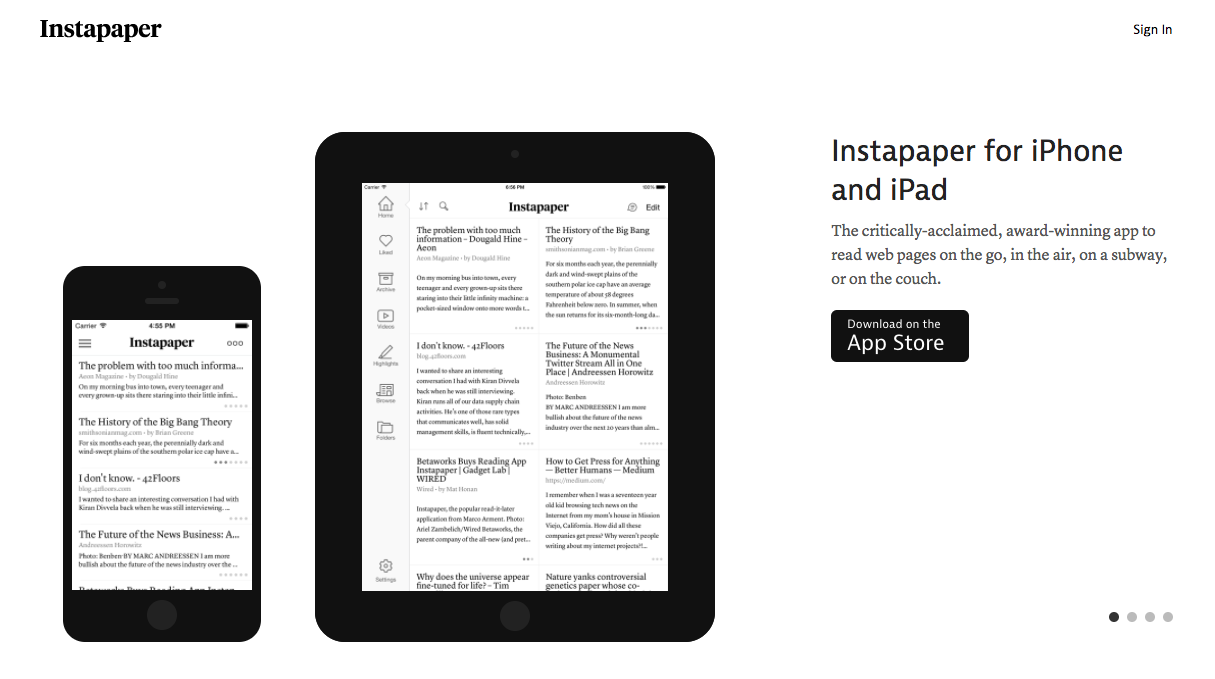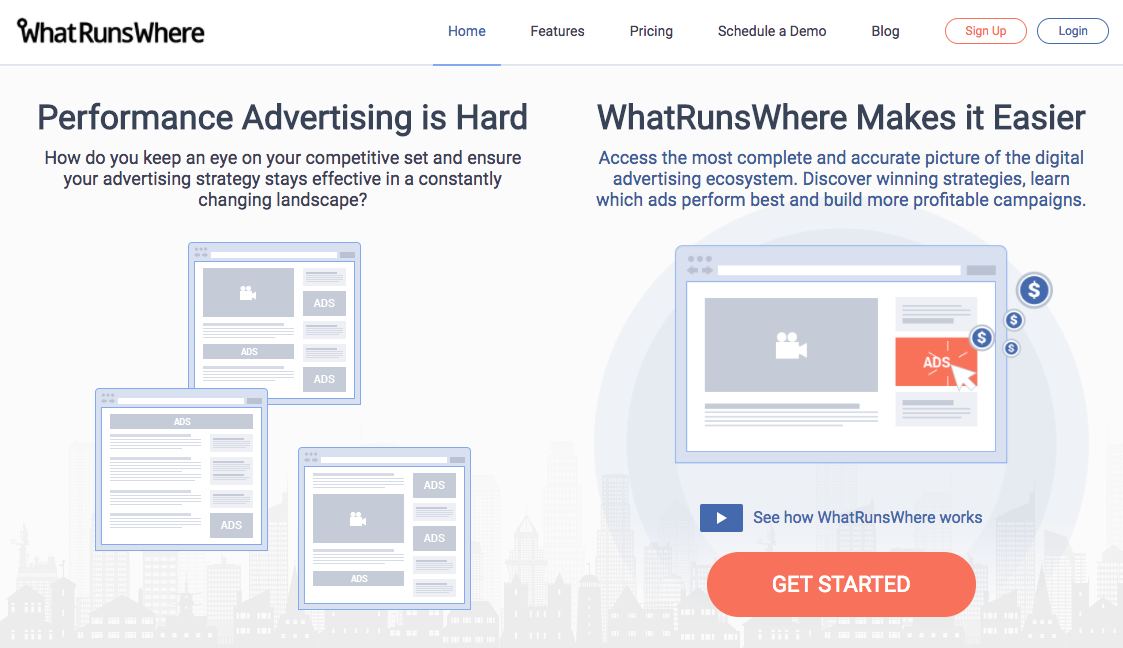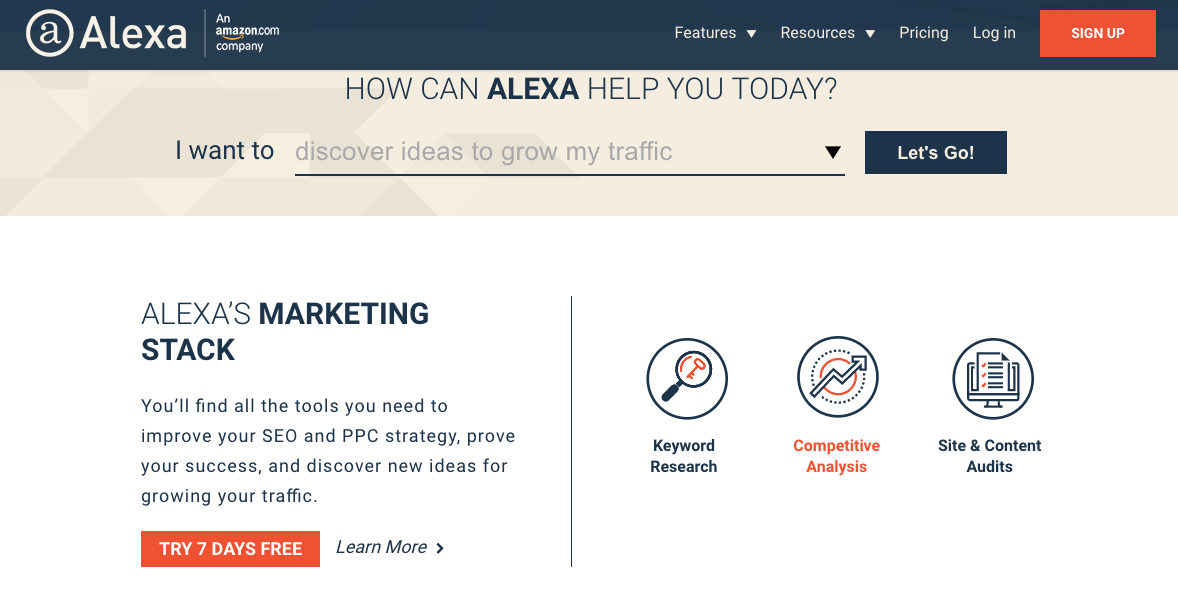Your business doesn’t operate in a vacuum.
There are countless outside factors that influence whether or not you’ll turn a profit. Your competition plays a huge role in the success of your business.
That’s why it’s so important for you to take the proper steps to gain a competitive edge on other brands in your industry. But, as I’m sure you’ve quickly realized, this is much easier said than done.
The ease of access to the Internet has amplified your competition at an exponential rate.
You’re no longer just competing with a few other local or regional businesses. You’ve got to worry about national and global brands as well.
What makes your company unique? What differentiating factors help you stand out? Why would a customer buy from you over your competitors?
These questions are difficult to answer, especially if you aren’t constantly researching the competition. But with so many other brands to keep an eye on, this can seem like a daunting task.
Not to worry. There are plenty of online tools to help you keep tabs on your competitors. I’ve narrowed down this list to the top 10 I found to be the most helpful.
If you try these out, it will be much easier for you to brand and market your business, taking into account what your competitors are doing.
1. Google Alerts
No list of online monitoring tools would be complete without Google Alerts.

This tool is about as easy to use as it gets. Simply sign into your Google account to get started. If you don’t have one, it will take only a couple of minutes to sign up.
Next, input the names of your competitors. Google takes care of the rest.
You’ll get an email report every time a competitor on your alert list gets mentioned online. You can set it up for links and keywords as well.
It all depends on what you want to track.
Google Alerts is great because it’s free to use. You’ll get notified when your competitors are mentioned so you can stay up to date on the latest information.
2. Social Mention
We know 71% of small businesses use social media to engage with their customers. This shouldn’t come as a surprise to you.
That’s why Social Mention is one of my favorite monitoring tools.

It’s super easy to use. Simply search for terms, keywords, or the names of specific brands, and the platform will show you what people are talking about across social networks and blogs.
The tool will tell you how often the brand gets mentioned as well.
This is a great opportunity for you to see what actual people are saying about your competitors in real time. There are plenty of ways for you to use this to your advantage.
If the comments are negative, you can try to avoid these errors yourself. You may even be able to exploit those mistakes in a marketing campaign, aiming to steal their customers.
But what if you see nothing but positive comments from people talking about your competitors? Don’t panic just yet. You can still benefit from this knowledge.
Figure out what your competitors are doing well and try to emulate it. What do they do best? Find a way to do it better.
3. Instapaper
What happens when you see something online about your competitors?
Do you instantly drop everything to read it?
I doubt it. You’ve got a business to run. While competitive analysis is important, it can’t take priority over everything else you’re doing throughout the day.
But that doesn’t mean you shouldn’t follow up on this information later. You can use tools like Instapaper to stay organized.

Instapaper behaves like a much more advanced version of a typical bookmark for web browsers. One of the best parts of this tool is you can access saved articles without an Internet connection.
So now, if you stumble upon some new information, a blog, or an article written by or about your competitors, you can save it and read it later.
The tool automatically optimizes the text so you won’t have to worry about messy scrolling or zooming the way you would have to on mobile sites. You can even adjust the font, size, spacing, and margins to your liking.
This tool is available for desktop and mobile devices. It doesn’t matter whether you use Apple or Android, they’ve got a version for you.
You can sync saved articles across all your devices as well. It’s perfect for those of you who want one place to conveniently read all articles about your competitors.
4. Monitor Backlinks
In addition to tracking your competitors’ names and social mentions, you should also be tracking their backlinks.
Backlinks play a huge role in website traffic and search engine optimization. That’s why in the past, I’ve given you tips for consistently building backlinks on a weekly basis.
If your competitors are smart, they will be trying to build as many backlinks as possible too. That’s why the Monitor Backlinks tool is crucial to your competitive analysis initiative.

This tool can help you figure out which competitor domains have the highest and lowest rankings.
It’s great information to help you learn which pages on their sites are getting the most traffic. You can also compare their results directly to your own website.
Here’s another reason why the Monitor Backlinks tool is something you need to take advantage of. It can help you build relationships with other websites.
Sometimes, backlinks happen by accident. A website or blogger may need to find an example or use online research to help add credibility to an article. So they search the web and find your competition.
Other times, your competitors may have relationships with certain websites. There could be some sort of arrangement that gives sites an incentive for linking one of your competitor’s pages.
Regardless of the case, reach out to those sites directly. Ask if you can be used as an example or resource in place of your competitors. Who knows, they may just go for it.
There are so many different opportunities for you to use this tool to your advantage. They offer a 30-day free trial, so it’s worth giving it a try.
5. SpyFu
With a name like SpyFu, it’s no surprise that this tool is a top choice for spying on your competitors.

Here’s how it works. After you search for the domain of your competitors, you’ll see where they’ve been on Google for the past 11 years.
This tool gives you access to keywords they bought on Adwords, all of their organic rankings, and each variation of their ads as well.
You’ll also have access to the success of their campaigns. Now you’ll know how much they are paying for each keyword and how many clicks they are getting.
As a result, you’ll be able to make better decisions when it comes to your own PPC campaigns. Don’t waste money on keywords that aren’t working for your competitors.
SpyFu also gives you access to keywords, backlinks, and content from your competitors that have a higher SEO ranking than you. This can help you see how you stack up against your biggest competitors.
Now you can make the necessary adjustments to improve your SEO rank and generate more leads. This will help give you the competitive edge you’ve been looking for.
6. WhatRunsWhere
The WhatRunsWhere tool specializes in advertisements.

You’ll be able to figure out how successful your competitor’s ads are. Based on this information, you can decide whether or not you want to replicate their winning strategies or avoid unprofitable campaigns.
Ads are constantly changing. It all depends on the goals of a company and what the consumers are demanding.
With WhatRunsWhere, you will know if your competitors find a new marketing strategy that works.
You’ll be able to see analytics and reports of the most current digital advertising landscape based on networks, devices, location, and time.
Unlike some of the other tools on our list, the WhatRunsWhere package isn’t free. Their most basic package starts at $299 per month.
7. SEMRush
When it comes to keyword analysis tools, SEMRush is a top choice for you to consider.

That’s because they specialize in competitive data analysis. Here’s what you need to do.
Simply type in the home page of your competitor’s website. SEMRush will get your instant information about their rank, traffic, ad keywords, and organic keywords.
All of this information is neatly organized into a graphic report that’s easy to read and understand. It’s a great way to digest and analyze data when it’s displayed this way.
You’ll also be able to see a side-by-side comparison of different domains so you can compare yourself to your competitors or compare two competitors to each other.
SEMRush can also help you generate keyword ideas for your own site as well, which can give you a competitive edge.
8. Alexa
As you may know, Alexa has features that rank websites and show information related to their traffic. But not everyone realizes that Alexa also has competitor analysis tools.

Most of the tools on our list so far require you to manually input information about your competitors. This can include their names, keywords, or domains.
But what happens if you don’t know who your competitors are? Alexa can help you identify which websites are your biggest competitors.
You can also compare your site to the benchmarks in your industry to see how you stack up against everyone else. Find out what you need to do to improve your rankings.
Alexa can also track different sites for you. You’ll get real-time information about how these websites are performing.
Another bonus feature of this tool is the partnership opportunities. You can discover websites that would be a good fit for guest blogging. This can also be used for influencer marketing and other advertisements.
Get connected with these opportunities before your competition has the chance to.
9. Woorank
Woorank offers website reviews and SEO audits for any website. All you need to do is type in a competitor’s website to generate a report.

While the basic version of this tool may be free, you’ll want to upgrade your membership to get all of the benefits it has to offer. The monthly plans range from $50 to $250, depending on the features you’re looking for.
You can compare your website to all your competitors’ sites from one dashboard. The tool helps you monitor things such as:
- keywords
- users
- bounce rates
- page views
- session durations
- new visits
You’ll also have access to social media reports. The reports are displayed on a week-to-week basis, so you can see how your site compares to the competition over time.
If your ranking continues to rise, you’re obviously doing things right and need to continue with your current plan. But if you are starting to decline, it’s time to reevaluate your strategy.
10. iSpionage
If you’re looking for another tool to help you monitor keywords, iSpionage is a top choice to consider.

Their reports will show you how your competition is grouping advertisements, keywords, and landing pages. You’ll be able to see which of these ads are getting the most traffic as well.
Unlike some of the other monitoring tools, iSpionage uses data from Bing and Yahoo in addition to Google, which can give you a more accurate representation of the results.
You’ll be able to identify the most profitable keywords and adjust your strategy based on what your competitors are doing.
iSpionage even shows an estimated monthly budget for your competition’s PPC campaigns.
Conclusion
Competitive analysis is a crucial component in the success of every business across all industries.
This statement holds true for companies both old and new. It doesn’t matter if you are trying to identify the target market of your startup or coming up with an advertising campaign for a brand that’s 20 years old. You need to monitor your competition.
But with so many competitors out there, it can be difficult to keep your eye on all of them.
That’s why you need to use technology. The list of tools I’ve outlined above can be extremely helpful.
I’m not saying you need to use all of them. Many of these tools have similar features.
Some tools focus on specific platforms, like social media, while others put more emphasis on backlinks, keywords, or advertisements.
It all depends on what you’re looking for. Decide how much you want to spend on tools to monitor your competitors and what type of information you want to get in return.
What types of tools does your company use to monitor your competitors?
from Quick Sprout https://ift.tt/2HJEt9p
via IFTTT
No comments:
Post a Comment